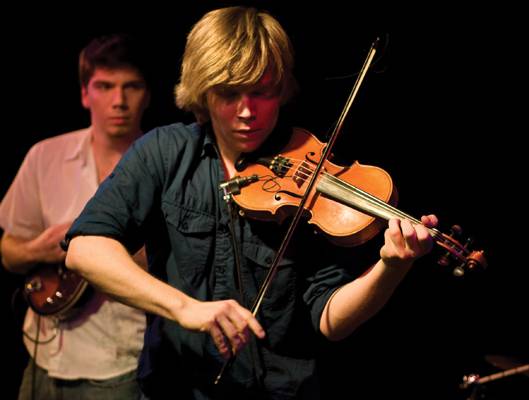On the front lines

River Breitbach, violinst for “Rivers and Tributaries,” the wildcard band that won Veishea’s Battle of the Band contest, plays during the band’s preliminary round performance at the Maintenance Shop Thursday. Photo: Gene Pavelko/Iowa State Daily
April 18, 2009
Editor’s note: The following story is a first-hand account of what it is like to perform in the Veishea Battle of the Bands, by James Laugerman, a copy editor at the Daily. Laugerman is a guitarist for the band Flipbook Composure, which performed Friday night.
“You have 30 minutes,” the stage manager tells us. “The clock starts now.”
This will be the second year I’ve had the privilege of playing in the Veishea Battle of the Bands with Flipbook Composure. Austin Auberg, lead songwriter, founder of the band and senior in psychology, has worked especially hard on our music since last year, and I’m excited to have the chance to perform on such a grand stage.
We practice the set all afternoon, fine-tuning all the set dynamics and transitions. The bass player, Marshall Lohrenz, senior in mechanical engineering, and I coordinate a cheesy jump during one of the breaks in the set. The violinist, Lissa Kelsey, junior in pre-architecture, lends me an extra bow, which I put to my guitar and make awkward whale-like noises. The drummer, Derek Pearson, freshman in kinesiology and health, hides his nervousness when I tell him how many thousands of Veishea wristbands have been sold.
Although I am slightly annoyed the Veishea committee raised the entrance fee for the bands to $75, it is hard to complain too much with our 9 p.m. slot on the most beautiful evening imaginable.
I head over early to watch my good friend Scott Gratton’s band, River and the Tributaries, open the competition at 6 p.m. I have to watch the first song from outside the gate, however, as the gatekeepers seemed to have forgotten the wristbands. Once inside, I cheer Scott on with a little more than 100 other people. His band puts on one of the best performances I’ve ever seen. The band’s violinist plays so fast he frays the hairs of his bow. The judges seem impressed, and I secretly hope that if Flipbook Composure loses to anyone, we lose to them.
After a quick dinner with the band, I head backstage to get ready to perform. We get some encouragement from some friends on the other side of the fence and listen to Cat Traffic. Although it isn’t my style of music, I am still impressed by the technical proficiency of the band. I realize that we’ll have to play our hearts out to win this competition.
The next thing I know, the clock has started, and I’m setting up my guitar pedals as fast as I physically can. I try not to pay attention to how many people are in the crowd. One of my friends is yelling my name from its midst, and I smile back from the stage, having no idea where he is. The lights on the stage are much brighter than I remember them being. After the quickest sound-check I’ve ever had, Austin starts our first song. Although I think I’ve played the song countless times, I have to think twice before playing the chords. Is this song in the key of A or E? I wait till the chorus to come in. My guitar is muffled in my stage monitor. I try to motion the sound guy, but I am looking in the wrong place and he doesn’t see me. I try to make up for flying deaf by putting my focus into dancing around the stage. My unseen friend cheers and yells my name again.
The set flies by, and my monitor is turned up about two decibels. Everything feels funny, but the crowd keeps cheering. Austin is playing like a champion. I make whale noises with the violin bow during our second song. Marshall and I time our stage jumping perfectly. I get the crowd to clap along to our finale.
Suddenly, my guitar strap breaks, dropping my guitar with a pitiful crash. The crowd gasps, or at least I imagine them to. I bend over to examine it, seeing its knobs scattered across the stage. It is a guitar player’s worst nightmare.
But then I catch myself. This is a rock concert, not some sort of high-school jazz-band performance. I look out to the crowd, and people are still cheering and having a great time. In some sort of backwards way, I tell myself this is really what it’s all about.
With pride, I hold my guitar up high and yell into the microphone:
“Veishea, yeah!”






